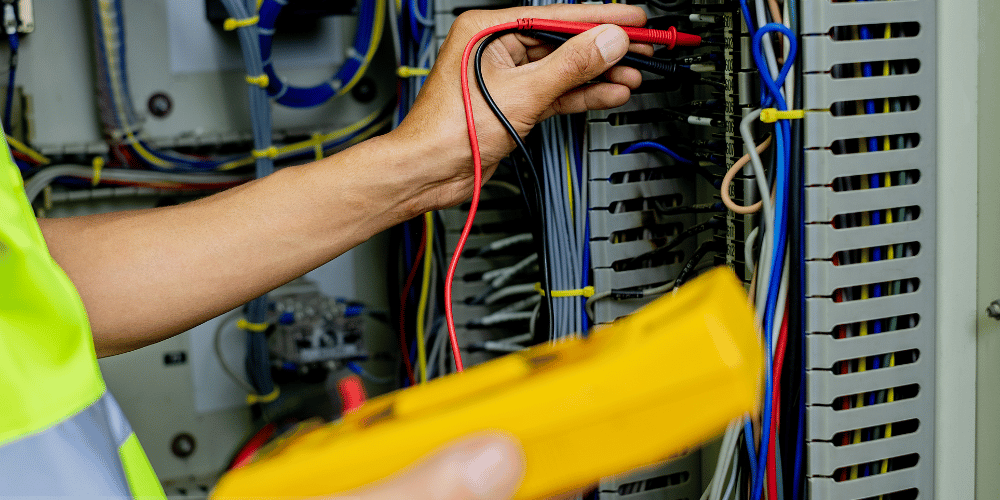Electrical inspections are crucial for maintaining the safety and functionality of your property’s electrical systems. Whether you’re a homeowner, landlord, or business owner, understanding what happens during an electrical inspection is essential.
This comprehensive guide explores the key components and processes involved in a thorough electrical inspection, empowering you with the knowledge to navigate this critical assessment.

Key Components of an Electrical Inspection
During an electrical inspection, also known as an Electrical Installation Condition Report (EICR), a qualified electrician will examine various aspects of your property’s electrical system. Here’s what you can expect:
1. Visual Inspection
The electrician begins with a thorough visual assessment of your electrical installation. This includes checking for:
- Visible damage to wiring, outlets, and switches
- Signs of overheating or burning
- Outdated components that may need replacement
- Proper labelling of circuits and consumer units
2. Wiring and Outlet Inspection
A detailed examination of the property’s wiring and outlets is conducted to ensure:
- Proper earthing and bonding
- Correct wiring connections
- Adequate insulation
- Appropriate placement of outlets, especially in wet areas
3. Electrical Panel and Circuit Breaker Assessment
The inspector will carefully evaluate your electrical panel and circuit breakers, checking for:
- Proper capacity to handle the property’s electrical load
- Functionality of circuit breakers and fuses
- Presence of RCDs (Residual Current Devices) for added protection
4. Testing Procedures
Various tests are performed to assess the safety and functionality of your electrical system:
Dead Tests
- Ring circuit loop impedance
- Insulation resistance
- Continuity testing
Live Tests
- Polarity testing
- Earth fault loop impedance testing
- RCD testing
5. Lighting Fixtures and Appliances Inspection
The electrician will examine:
- Proper installation of lighting fixtures
- Functionality of switches and dimmers
- RCD protection in wet areas like bathrooms and kitchens
6. Electrical Service Entrance and Meter Base Evaluation
This includes checking:
- Condition of the service mast, weatherhead, and service cable
- Proper earthing and bonding of the service entrance
- Secure installation and accessibility of the metre base
The EICR Report
Upon completion of the inspection, you’ll receive an Electrical Installation Condition Report (EICR). This crucial document will:
- Classify the overall condition as ‘satisfactory’ or ‘unsatisfactory’
- Detail any observations affecting safety
- List any required improvements
- Provide fault codes for identified issues:
- C1: Danger present, immediate action required
- C2: Potentially dangerous, urgent remedial action needed
- C3: Improvement recommended
- FI: Further investigation required
Legal Requirements and Frequency of Inspections
For landlords in England, it’s now a legal requirement to have an EICR conducted every five years for rental properties. While not legally mandated for homeowners, it’s highly recommended to have an EICR performed when purchasing a property and periodically thereafter.
Duration of an Electrical Inspection
The time required for an electrical inspection can vary depending on:
- Property size
- Number of circuits
- Complexity of the electrical installation
- Any issues discovered during the inspection
As a general guideline, allow approximately 30 minutes per circuit for a thorough inspection.
Preparing for an Electrical Inspection
To ensure a smooth inspection process:
- Ensure all electrical outlets and switches are accessible
- Clear areas around the consumer unit and metre
- Have any previous EICR reports available for the electrician
Final Thoughts
Understanding what is checked during an electrical inspection helps you appreciate the importance of this crucial safety measure. Regular electrical inspections not only ensure the safety of your property and its occupants but also help identify potential issues before they become major problems.
At DH Electrical, our team of experienced electricians in Liverpool is committed to providing thorough and professional electrical inspections. We ensure your property’s electrical systems meet all necessary safety standards and regulations. Contact DH Electrical today to schedule your comprehensive electrical inspection and enjoy peace of mind knowing your property’s electrical systems are in good hands.
Related Articles:
• A Guide to Electrical Installation Condition Reports (EICRs)



